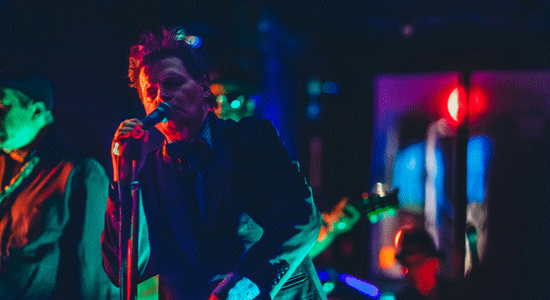
No-wave sax legend James Chance returns with his first U.S.-released album in decades
That James Chance 2017 sounds very much like James Chance 1977 has nothing to do with a rut or retro vibe. Chance—or James White or James Siegfried (the name he was born with in Milwaukee)—has forever had a long, deep, abiding passion for James Brown, Su Ra and Albert Ayler, and on early albums such as Buy and Off White (both from 1979) or latter-day efforts such as 2012’s unreleased-in-America Incorrigible, made off with the riveting speed-soul grooves and atonal skronky sax blasts like a thief in the night. For his first U.S.-released album in decades, The Flesh Is Weak, with his most notorious outfit, the Contortions, the NYC-based Chance continues to mine fast, moody jazz and digs deep into fertile funky ground with the furor of a punk twice as young as he.
“I think that’s why I have a young following when we play,” says the 63-year-old Chance. “The aggression that came out in my music in the past is still there today. I’m not one of those guys who gets to a certain age and feels as if he’s got to mature and act more responsibly. I mean, I’m not contemplating fatherhood.”
It’s more than apparent on The Flesh Is Weak that he refuses to mellow, ripen and rot as Chance and his Cortortions machine gun through everything from hyped-up covers of Esther Phillips’ “Home Is Where The Hatred Is” and his jagged self-penned 1980 song “Melt Yourself Down” to newer, corrosive cuts such as the title track. Along with playing all of the yakety sax cackles and occasional lilt-a-whirl organ solos (“I wasn’t a fan of jazz organ for a long time until Sun Ra,” says Chance) on The Flesh Is Weak, Chance’s usual angular rhythms and kinked guitars—familiar to the no-wave genre he helped birth in 1978—get a mod revisionist feel with occasional Latin popcorn shuffles.
Such restless invention is the thing that brought him to Manhattan from Milwaukee, “where I learned to read music from nuns in the Catholic school I attended,” then moved him from participating in NYC’s downtown loft-jazz scene (“I didn’t fit in; I had a band called Flaming Youth named for a Duke Ellington song, but that confused audiences who thought we were a heavy-metal group”) and landed him squarely in pre-punk clubs such as Max’s and CBGB. “Those bands didn’t excite me either,” he says. “Save for Suicide and Richard Hell’s Voidoids, there was nothing inventive to be heard there.”
So Chance crafted a sound based, in part, on punk’s zealous energy (“We wanted to throw out stereotypical chords and make it even more primal,” says Chance, regarding no-wave), as well as Brown’s densely soulful raw chord changes and repetitious hypnotic rhythms. “Especially the song ‘Super Bad,’ which was super-heavy funk with wild Ayler-like sax solos,” says Chance enthusiastically. Quoting from Amiri Baraka’s Black Music, the saxophonist says, “Free jazz should join forces with R&B—that’s the fusion I wanted.”
Along with making a name and career for himself in France (“just like Jerry Lewis”), Chance made a few stops at slower jazz standard albums with his Terminal City outfit such as 2010’s The Fix Is In. He even laughs about trying his hand at oddball big-band music.
“The swing revival was horrible, too corny for New York, but I figured I could use it to my advantage,” he says. “Yet by the time I had written a bunch of tunes, the revival had ended. Good.”
Now, 38 years after Buy, Chance and his Contortions are making a bold, righteous racket with Flesh Is Weak and a vigor he hasn’t felt for a minute. “I don’t plan on stopping anytime soon,” he says, considering everything from covering Frank Sinatra’s “That’s Life” (“It was one of the first 45s I bought, so dramatic, and my wife, Judy Taylor, has been pushing me to put it out”) to making sure each Contortion he plays with is as free and loose as he is tight.
“Plus, I still look good in a tux,” he says when his sartorial signature comes up in conversation. “That’s crucial.”
—A.D. Amorosi







